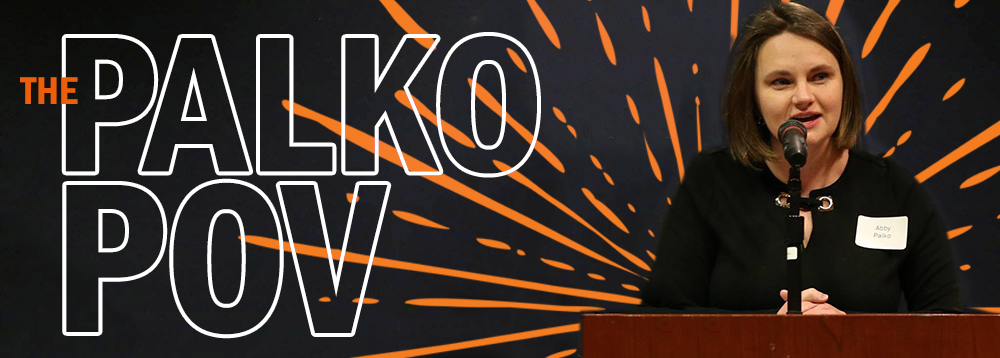
We Move, Therefore We Are
 In the days and weeks following the women’s marches, #whyIMarch proliferated around social media as women felt compelled to explain their individual reasons for supporting the marches. Inherent in these reflective pieces was a sense that life in 2017 still poses gendered challenges to women. My educational and professional background has prepared me to see these moments in which we all (re)awaken to this reality coming so I’m often spared the shock felt by many. But in looking back on February’s events here at UVA and in Charlottesville, I did find that I was surprised by a common theme in remarks I crafted for two different events at which I recently spoke: the movement of the body in and through the public sphere.
In the days and weeks following the women’s marches, #whyIMarch proliferated around social media as women felt compelled to explain their individual reasons for supporting the marches. Inherent in these reflective pieces was a sense that life in 2017 still poses gendered challenges to women. My educational and professional background has prepared me to see these moments in which we all (re)awaken to this reality coming so I’m often spared the shock felt by many. But in looking back on February’s events here at UVA and in Charlottesville, I did find that I was surprised by a common theme in remarks I crafted for two different events at which I recently spoke: the movement of the body in and through the public sphere.
At first glance, these two events had little to nothing in common. First, I offered the opening remarks at UVA’s National Girls and Women in Sports Day, at which we honored the athletic achievements of Leah Smith, UVA’s gold-medal winning Olympic swimmer. A couple of weeks later, I spoke at Charlottesville’s first annual One Billion Rising event. One Billion Rising, an off-shoot of the V-Day campaign associated with the Vagina Monologues, is an awareness campaign designed to draw attention to the fact that one in three women and girls experience sexual assault and personal violence. While both focused on women and girls, the former event was a celebration of progress and the latter a reckoning of how far we still have to go. At One Billion Rising, I reflected on Emma Goldman’s insistence that her personal dedication to political activism in service of social justice did not have to preclude having fun. Her biographer, Alix Kates Shulman, shares Emma’s story from her early years as an activist of being pulled aside at a dance by a young man anxious to impress upon her that “it did not behoove an agitator to dance” because her “frivolity would only hurt the Cause.” Emma Goldman was not impressed: “I did not believe that a Cause which stood for a beautiful ideal, for anarchism, for release and freedom from conventions and prejudice, should demand the denial of life and joy. I insisted that our Cause could not expect me to become a nun and that the movement should not be turned into a cloister. If it meant that, I did not want it.” And Emma danced.
Weeks earlier, in preparing to celebrate Leah Smith and the importance of athletic opportunities for women on National Girls and Women in Sports Day, I had chosen to share another piece of history that also reminds us to more closely consider the movement of the body in and through the public sphere. In a Technology column for The Atlantic a few years ago, Maria Popova recommended Sue Macy’s book, Wheels of Change: How Women Rode the Bicycle to Freedom (With a Few Flat Tires Along the Way), which relays the story of the transformative role that the bicycle played in women’s evolving relationship to the public sphere. Popova includes Macy’s excerpt from a May 1896 article entitled “Woman and the Wheel” in Munsey’s Magazine (the first mass-marketed US magazine):
“To men, the bicycle in the beginning was merely a new toy, another machine added to the long list of devices they knew in their work and play. To women, it was a steed upon which they rode into a new world.” The bicycle opened up a world that had been constricted by the clothing women wore, restrictions on their movement in the public sphere, and their economic dependence on the men in their lives. Straight through from Susan B. Anthony’s own day to the present, those in the know have been bold in their assertions that the bicycle played a very real role in the movement for women’s suffrage in the U.S. So, I’ve found myself thinking a lot in the past few weeks about how the concept of identity politics shapes our perceptions of the world through which we move. This is crucial because when any single one of us is vulnerable, every single one of us is vulnerable. Identity politics matter precisely because when we marginalize anyone on the basis of their identity, we have accepted the premise that it is ok to marginalize anyone on the basis of any aspect of identity. And, as many of you know, we need to carry this insight one important step further. While we each experience the world through the lenses of our various aspects of our identity, for those of us who identify with multiple marginalized groups, our marginalization is exponentially magnified. Here at the Women’s Center, we work to foster the respect, safety, and dignity of women and girls by working for gender justice on Grounds and across the globe, and we call on our many alums, colleagues and friends to do so from wherever you are. It is crucial that we remember to listen to women, to hear and honor their experiences and ways of moving through the world – and it behooves us to dance!
This is the first of many posts to come in our new blog series, The Palko POV. As the Director of the Women's Center, Abby Palko has a rich array of interactions in the UVA community far and wide and we’ll bring you the insights she gains from those here. Stay tuned!

